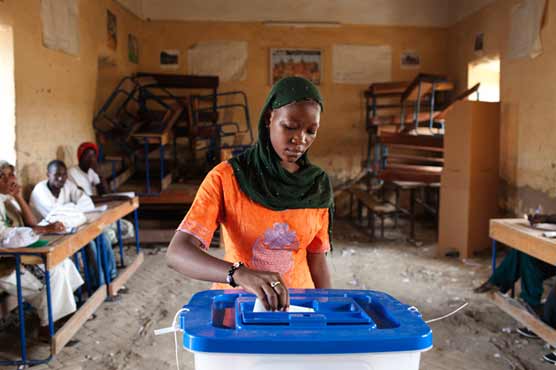Suicide blast mars Mali elections

The polls mark the troubled west African nation's first steps to recovery.
BAMAKO, Dec 15, 2013 (AFP) - Malians began voting on Sunday in the second round of parliamentary elections intended to cap the nation s return to democracy, but overshadowed by the deaths of two UN peacekeepers in an Islamist attack.
The polls mark the troubled west African nation s first steps to recovery after it was upended by a military coup in March last year, finalising a process begun with the election of its first post-conflict president in August.
Turnout looked low as polling stations opened in the capital Bamako, sparking fears that voters would be scared away by an upsurge in violence by Al Qaeda-linked rebels against African troops tasked with election security alongside the Malian army.
At least two Senegalese UN peacekeepers were killed on Saturday when a suicide bomber ploughed his explosives-laden car into a bank they were guarding in the northeastern rebel bastion of Kidal.
Sultan Ould Badi, a Malian jihadist linked to several armed groups, said the attack was in retaliation for African countries support of a French-led military operation launched in January against Islamist rebels in northern Mali, which ethnic Tuareg s call "Azawad".
"We are going to respond all across Azawad and in other lands... with other operations against France s crusades," he told AFP by telephone.
The French army has been carrying out an operation against armed Islamists north of the desert caravan town Timbuktu over the past week.
The offensive targeting Al Qaeda in the Islamic Maghreb (AQIM) is a "huge military operation, the largest in the Timbuktu region since the major northern cities were retaken by allied forces" an African military source in Timbuktu told AFP.
Twenty jihadists have been killed so far, according to French and African military sources.
Voting a moral duty
=====================
Just 19 of the national assembly s 147 seats were allocated in the first round on November 24, with turnout at 38.6 percent, a drop of almost 13 percentage points from the first round of the presidential vote.
After the first round of the parliamentary election, Louis Michel, chief of the European Union observation mission, called on "all political actors" to turn out in the second round Sunday.
"In the specific context of Mali, voting is not only a right, it is a moral duty," he said.
But the campaign failed to capture the imagination of the electorate and many analysts in Bamako are expecting feeble participation.
In the restive north, the vote takes place in the Gao and Timbuktu regions, with seats in Kidal decided in the first round. Two of the new intake are former rebels who laid down their arms to join President Ibrahim Boubacar Keita s ruling Rally For Mali (RPM).
The party has vowed to deliver "a comfortable majority" to smooth the path for reforms Keita plans to put in place to rebuild Mali s stagnant economy and ease the simmering ethnic tensions in the north.
But analysts have speculated that the RPM may have to form a coalition with the Alliance for Democracy in Mali, one of the country s most established parties, which was split during the presidential polls between Keita and his rival, Soumaila Cisse.
Cisse, who is vying to represent the Union for the Republic and Democracy (URD) in his home region of Timbuktu, aims to become the leader of the parliamentary opposition.
He was among the fiercest opponents of former junta chief Amadou Sanogo, who has recently been charged with murder, complicity to murder and carrying out kidnappings after overthrowing the democratically elected government in March last year.
Sunday s election is being supervised by hundreds of Malian and international observers who will mainly stick to Bamako and central Mali, with the north considered too dangerous.


